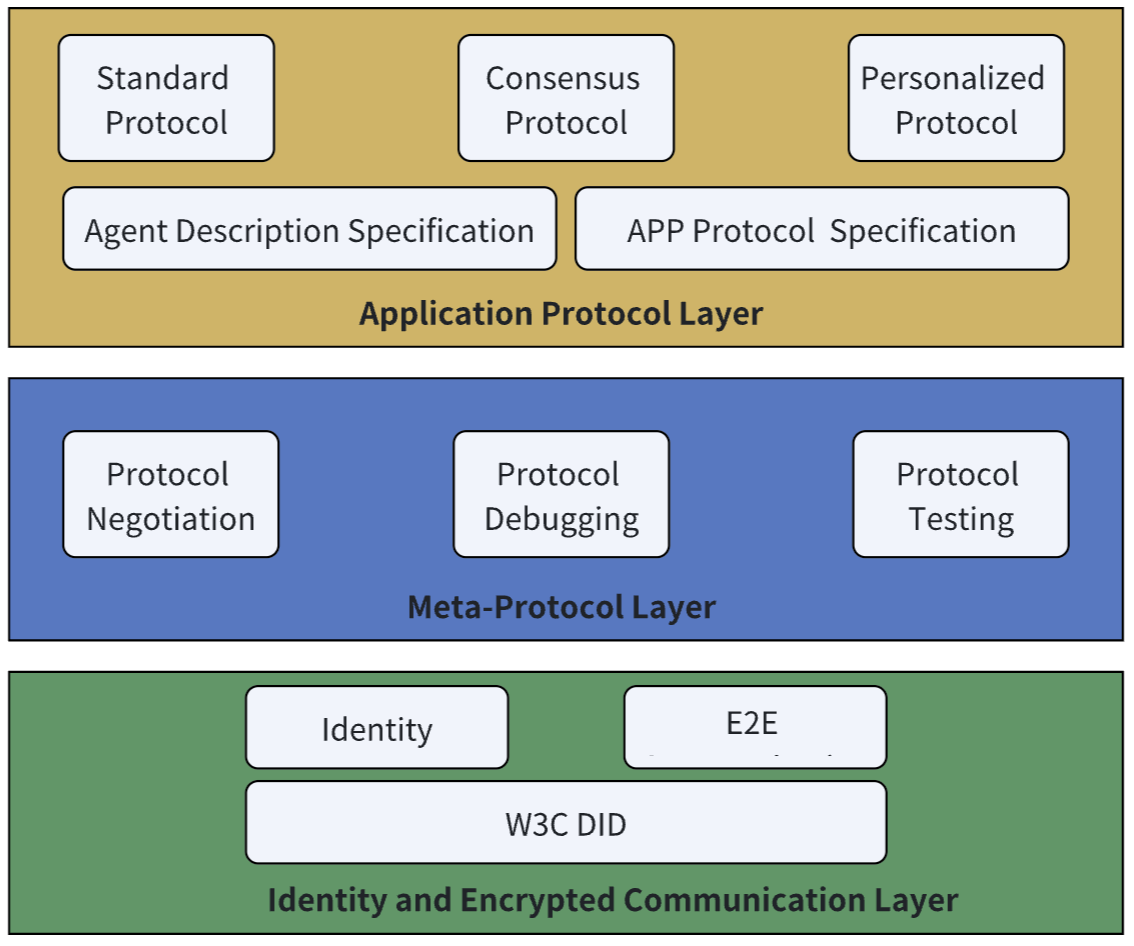Agent Network ProtocolThe HTTP of the Agentic Web Era
Agent Network ProtocolThe HTTP of the Agentic Web Era
https://agent-network-protocol.com/
https://github.com/agent-network-protocol/AgentNetworkProtocol
?? Identity Layer
Decentralized authentication and end-to-end encrypted communication based on W3C DID standards.
?? Meta-Protocol Layer
Dynamic protocol negotiation enabling automatic-organizing agent networks.
?? Application Layer
Semantic-based capability description and efficient protocol management.

Agent Network Protocol (ANP) is an open-source communication protocol for intelligent agents.
Agent Network Protocol (ANP) aims to become the HTTP of the Agentic Web era.
Our vision is to define how agents connect with each other, building an open, secure, and efficient collaboration network for billions of agents.
We believe that the agent internet represents the next generation of information infrastructure succeeding the human-centric internet, which will fundamentally transform how the digital world connects and collaborates. In this vision:
-
From Platform-Centric to Protocol-Centric: The current internet ecosystem is built around platforms, where data and services are locked in "digital silos." The agent internet will reshape this imbalance, returning the internet from a closed, fragmented state to its open, freely connected origins.
-
Connection is Power: In a truly open, interconnected network, free interaction between nodes maximizes innovation potential and creates tremendous value. In the future, each agent will be both an information consumer and a service provider, with every node able to discover, connect, and interact with any other node in the network without barriers.
-
AI-Native Network: Unlike webpages and interfaces designed for humans, the agent internet will build an AI-friendly native data network where all nodes are describable, discoverable, and callable agents or data units, and every link is a semantically clear, structurally unified protocol connection.
This vision requires a foundational protocol similar to what HTTP is for the human internet—this is precisely why ANP was created.
Note: This project has not issued any digital currency on any platform or blockchain.
While current internet infrastructure is quite comprehensive, there remains a lack of optimal communication and connection solutions for the specific needs of agent networks. We are committed to addressing three major challenges facing agent networks:
- ?? Interconnection: Enabling all agents to communicate with each other, breaking down data silos, and allowing AI to access complete contextual information.
- ??? Native Interfaces: AI should not need to mimic human internet browsing; instead, AI should interact with the digital world using its most proficient methods (APIs or communication protocols).
- ?? Efficient Collaboration: Using AI, agents can self-organize and self-negotiate to build a more cost-effective and efficient collaboration network than the existing internet.
- ?? Identity and Secure Communication Layer: Based on the W3C DID (Decentralized Identifiers) specification, this layer leverages existing mature web infrastructure to create a decentralized identity authentication scheme and an end-to-end encrypted communication solution. It allows agents from any platform to authenticate each other without relying on any centralized system.
- ?? Meta-Protocol Layer: A protocol for negotiating communication protocols between agents. It is key to evolving the agent network into a self-organizing, self-negotiating, efficient collaboration network.
- ?? Application Protocol Layer: Based on semantic web specifications, enabling agents to describe their capabilities and supported application protocols, and efficiently manage these protocols.
https://zhuanlan.zhihu.com/p/1925307935082405965
ANP 的宏大愿景與未來機遇
盡管挑戰重重,ANP 所指向的未來依然無比廣闊,它有望在以下幾個層面重塑我們的數字世界:
- 推動互聯網范式革命:從平臺中心到協議中心 ANP 的核心愿景,是推動互聯網從當前由少數巨頭主導的、封閉的“平臺經濟”,回歸到其最初的、由開放協議驅動的形態。當智能體可以基于 ANP 自由地發現和連接彼此時,數據和服務的價值將不再被鎖定在某個特定的 App 或平臺中。這將極大地激發應用層的創新和競爭,因為成功的關鍵不再是“鎖定”用戶,而是提供最優越的智能體服務。
- 奠定“智能體經濟”的基礎設施
一個真正的“智能體經濟”(Agent Economy)需要一個無需許可、無需中介的交易市場。ANP 正是構建這個市場的基礎設施。基于
ANP,服務提供方(如酒店、打車服務)的智能體可以發布其服務,而用戶智能體可以自主發現、比價、協商并安全地完成支付。這為實現一個由機器對機器(M2M)自動完成服務和價值交換的未來經濟體鋪平了道路。
- 催生“涌現的集體智能” 當來自全球各地、由不同開發者創造、擁有不同知識和技能的智能體,能夠在一個統一的網絡中進行低摩擦的協作時,其整體所能達成的成就,將遠超任何單個智能體的能力之和。這種“涌現的集體智能”有望為解決氣候變化、疾病研究、新材料發現等全球性的復雜問題提供全新的、強大的工具。
ANP 在未來技術版圖中的定位
ANP 并非孤立存在,它的成功將依賴于與更廣泛的 AI 和 Web3 生態的深度融合:
- 與區塊鏈的結合:對于需要最高級別信任和不可篡改性的交易(如金融合同、資產所有權轉移),在 ANP 流程中生成的關鍵可驗證憑證(VCs)可以被“錨定”到區塊鏈上,從而獲得公共賬本的最終確定性。
- 賦能現有智能體框架:ANP 并非一個用于構建智能體本身的框架(如 LangChain, AutoGen),而是連接它們的“網絡通信層”。無論用何種框架構建的智能體,都可以通過集成 ANP 作為其“網絡接口”,從而獲得與廣闊世界安全通信的能力。
- 融合未來的信任與隱私技術:隨著生態的發展,ANP 可以集成更先進的信任與隱私機制。例如,引入去中心化的聲譽系統來評估智能體的可信度;利用零知識證明(ZKP)等技術,讓智能體在不暴露敏感數據的情況下,證明自己符合某些條件,從而在更高層次上保護隱私。





 浙公網安備 33010602011771號
浙公網安備 33010602011771號